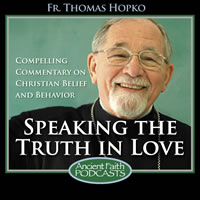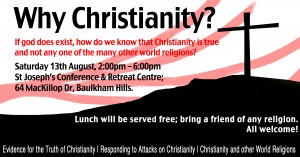The ability of the human being to see reality in a biased way never ceases to amaze me.
An extreme modern example of this is the outspoken evangelist of atheism, Professor Richard Dawkins. In his recent book, “The God Delusion”, he not only attributes all forms of religion to mental illness, but he also describes that tender special process of parents passing on their cherished faith to their children as ‘child abuse’. Not content with that, he goes so far as to criticise the God of Christianity for exhibiting ‘sadomasochism’ in the Crucifixion of Christ, thus reducing the most precious and intimate act of love in the history of world to the level of an unnatural human fetish.
The easy reaction to such words would be anger and indignation. If he doesn’t believe, at least he should respect the beliefs of others! That may be the easy response, but I don’t think it is the right one. After all, we too (Christians I mean) have our own history of seeing things in quite a biased way. We are human too.
The Dawkins example I gave above illustrates bias combined with belligerence, but there are also nice ways of being biased. One example of this ‘nice’ bias that springs to mind is that of the late Fr Bishoy Kamel, the Coptic priest who served in Alexandria and Los Angeles in the 1960’s and 70’s. If my reading of the limited English translations of his many writings is accurate, Fr Bishoy was every bit as biased as Dawkins, but in quite a different way. Rather than reading evil into the good of others, he was most adept at reading good into the evil of others.
Among his favourite books of the Bible was the Song of Solomon, a relatively explicit love poem that many modern preachers keep away from, so stark is its language of love. But Fr Bishoy saw in the love between a man and a woman a holy icon of the love between Christ and the human soul. Of course, this was not an original discovery by Fr Bishoy. St Paul wrote of this living metaphor two thousand years ago in his letter to the Ephesians. But what makes Fr Bishoy’s approach stand out is that he lived it.
To read this celibate’s description of how he cries out to Jesus as he goes to sleep in his bed, to come and embrace him, to place His gentle hand behind his head and hold him close; only a man who has risen above the earthliness of physical intimacy could write so freely and honestly of spiritual intimacy. In this married celibate’s words I find a better description of the purity of celibacy than one can find from most monks and nuns! He did not fear intimacy and flee from it, he sanctified it! For Fr Bishoy, the spirit purifies the body completely; good triumphs over evil – it is as simple as that, and there is just no question about it. That’s pretty opinionated!
And yet, I believe that this is indeed the true spirit of Christianity, indeed, of Christ Himself. Was it not He who sought out the outcasts of society and broke so many taboos in the name of divine love? Was it not His positive attitude towards sinners, seeing the potential good in them rather than their evil past, that saved so many from destruction? Which makes me wonder: what would happen if an opinionated and biased atheist like Professor Dawkins were to one day meet Jesus? The following is of course a fiction, and I hesitate to guess what Jesus would say (I have no special insight) or what Dawkins would say, but it is interesting to contemplate…
* * * * *
Professor Richard Dawkins was turning in for the night. It had been a long and hard day. Three media engagements, a book signing and then that debate at the university. But it has been a satisfying day. His opponent in the debate had been a little underprepared which had allowed him to take him apart, much to the pleasure of a largely sympathetic audience of noisy university students. Ahh… this had been a good day.
Suddenly, the bedroom filled with light. Wondering if a car had pulled up and shone its high beam at his window, he walked over to draw the curtains and perhaps see who this was who so impertinently and thoughtlessly had disturbed his repose. Could someone be visiting him at this time of night? But there was no car outside; in fact it was quite dark. A gentle rustle behind him made him twirl around suddenly and shout in fright, “Who the devil are you? And how in blazes did you get into my house?”
The shining man with the beard smiled at the professor and the glow that seemed to emanate from His face slowly faded away until He was left standing on the carpet like any other man, except perhaps for His long flowing robes and the wounds in His hands and feet.
“No, actually, I am not the devil. Quite the opposite.” A small smile played on His lips. “Never mind how I come to be in your house. I have come to ask you a question. Why do you hate me?”
“Who are you? Where did you come from? I don’t know you, and if you don’t leave immediately I shall call the police!”
“I think you know who I am, Richard. Do you not recognise Me?”
“Oh tosh, man! Do you think you are Christ? Come now, which mental hospital have you escaped from?”
“Ah, so you do recognise Me. But My question remains unanswered: Why do you hate Me?”
“Firstly, I do not for one moment accept that you are Jesus Christ: let’s get that clear. But for the sake of argument, I will answer your question. I don’t hate you; I simply don’t believe in you.”
“Why is that Richard?”
“Where have you been living for the past thirty years? My arguments are all over the media and they fill the bookshops. Someone who knows where I live must surely have at least read some of my books.”
“Why do you not believe in me, Richard?”
“OK, I’ll humour you. One: because all religion simply evolved to meet natural needs for human survival. Two: because sacred texts are full of contradictions and inaccuracies. Three: because modern science has eliminated the need for a “God of the gaps” to explain things that we couldn’t understand. Is that enough for you?”
“What do you say to the millions of devout and highly intelligent and educated Christians who see things differently?”
“Huh, that’s easy. WAKE UP! Open your eyes! Stop being deluded! The evidence is there and it’s black and white, so stop fooling yourself and come into the twenty first century for God’s sake!” The little smile played upon the lips of the Bearded Man once more.
“You cannot imagine seeing in that same evidence any other interpretation than yours, then?”
“Oh, there may be many different interpretations of the evidence, but there’s only one CORRECT interpretation, and it just happens to be mine.”
“And what would it take to convince you otherwise? What would it take to convince you that God exists, that I am real?”
“Well, if God is really there, why doesn’t He just show Himself to everyone? Why doesn’t He just appear and say, ‘Here I am everyone. You can stop doubting Me now’.”
“Well, Richard, here I am. You can stop doubting Me now.”
The professor paused for a moment as though considering the proposal put to him by this strange man. He certainly had an honest face, something in it told him intuitively that whatever this man might be, he was not a liar. He must be a manic depressive who really believed he was Christ. And yet, he seemed so calm, so in control, so sane.
“Well if you want to make a claim like that, I’m afraid you’re going to have to back it up. Prove to me that you are the real Christ. Go on then.”
“Was the light that filled the room and my sudden appearance out of nowhere not convincing for you?”
“You probably have a torch hidden up that big sleeve of yours. Well, you can do anything with electronics these days. And I didn’t see you come in. You could have come in through the door.”
“Did you hear your door squeak as it always does?” How the blazes did he know that my bedroom door squeaks, thought the professor to himself. But of course: he just walked through it a few minutes ago.
“I was distracted by the light. A common conjuror’s trick: distract your audience’s attention with one thing so you can get away with the illusion. I can show you some articles on it if you like.”
“Then what would it take to convince you Richard?”
“You’d have to do something genuinely supernatural, here in the open where I can see it, where I can measure it and observe it scientifically.”
“Alright then, if that’s what you’d like. You see that cup of water over there? You filled it up yourself from the tap just a few moments ago, didn’t you?” The professor nodded. “Would you like to pick it up and taste it?” The professor did so. “It is tap water, is it not?” Another nod. “Then kindly taste it again for Me.” The professor held his nerve well. He needed to, for when he looked at the glass, its contents were no longer clear but a rich burgundy hue. He smelled it and gingerly tasted it. A rich red wine. He turned back to the Bearded Man.
“Oh very clever young man, very clever. Turning water into wine, hey? OK, you’ve read your gospels, and I’ll admit that was a very clever trick. How did you do it? Slip a tablet in when I wasn’t looking? Sorry, but that’s no proof. I’ve seen better illusionists than you.”
“But isn’t that what you asked for?”
“Sorry, but you’ll have to do better than that, my friend.” This he said in a tone that suggested anything but friendliness.
“Then what would you have Me do to convince you, Richard?”
“Look, if God exists and wants us to believe in Him, He can appear as a towering giant floating above London and blocking out the sunlight. He can rain thunderbolts on anyone who doesn’t accept him as an example to others. If He really wanted to, He could put the matter beyond all doubt. So why doesn’t He? I’ll tell you why, my friend. Because He doesn’t exist, that’s why. He’s just a figment of people’s imagination that was perpetuated by corrupt clergymen for their own personal benefit. And eventually, people came to believe the lie. That’s all there is to it.”
“And if I were to remove all doubt, would you love Me?”
“Oh, yes: prove yourself to me and I’ll believe in you. I am a scientist, you know. I do have an open mind.” Again, the little smile.
“But I did not ask if you would believe in Me. I asked if you would love Me. I love you, you know.”
“Oh, tosh! Not this ‘love’ thing again. Look, there is no such thing really as love. All there is just hormones and chemical messages in the brain. Love is nothing more than an electrochemical phenomenon.”
“Again, you have evaded My question. Again, I ask it. Would you love Me?”
“Oh, look: if God were to prove beyond all doubt that He really does exist, then, yes, I suppose I would do what He says. I’m not stupid, you know. But see, that’s why religion is such a fake. It’s all about guilt and making atonement and hoping to please this big Judge in the Sky so He doesn’t cast you into everlasting fires of damnation. No, sorry: God just can’t be real. I won’t accept that.”
“You don’t think you may have misunderstood what God is really all about?”
“No, I haven’t. It’s all there to read in black and white, you know. It’s all in the Bible, the fire and brimstone and the everlasting flames of hell.”
“Perhaps you are reading only what you want to read and ignoring the rest if it does not fit in to your preferred interpretation?”
“I told you before, man. I am a scientist. Scientists are objective. They gather evidence and draw theories out of that evidence. Then they test them and thus prove or discard them. Why don’t you listen?”
“So from what you say, it seems that I cannot win. If I show you My power, you will attribute it to illusion or epilepsy or aliens. If I prove Myself to you beyond doubt, you still will not love Me, but only seek to gain personal advantage from the situation. It would seem that whatever I do, you have already made up your mind. You have made your choice and nothing will change it.”
“Absolute rubbish! I have an open mind. Go on then, prove to me that you are really God, or Christ, or whichever deity you wish to masquerade as this week. Go on then, I’m all ears.” The Bearded Man gently shook His head and muttered, “There are none so blind as them that will not see.” Aloud, He said:
“I will leave you now Richard. I know there is good inside you still. But you have become so encrusted in the shell of your own confidence and pride that you have lost the very thing you first set out to achieve: Truth. I will visit you again, for I do not lose hope that one day you may be healed. But I will not visit you again like this. You have closed that door to Me and locked it. Goodbye.” And with that, He was gone. He did not leave by the door or jump through the window. He did not ascend through the ceiling; He was just … gone.
For a moment, the professor stood like a statue, gaping at the spot where the Bearded Man had stood just seconds ago. Then he shook his head and turned around to go and brush his teeth. “Damn magician of a mental patient! I really must speak to the Minister of Health about the lax security these days. One of these days, someone is going to get hurt!”
Fr Ant



